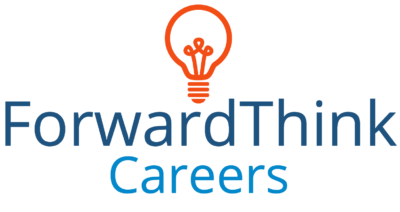

There you are at the end of the interview…feeling pretty solid because you’re sure you just nailed it. But then the interviewer turns to you and says, “So, do you have any questions for us?”
Before you can muster an answer, your palms start to sweat and you feel your chest tighten a bit. I mean, you spent all those hours preparing how to answer the most challenging interview questions — but somehow gave zero thought to what you were going to ask them.
While you might be tempted to say “nope, I think I’m all set” and then skedaddle out the door, you KNOW this wouldn’t leave the best final impression…and you’d be right.
When I was a recruiter, I was always surprised when candidates didn’t have any interview questions at the end. I thought, there must be some aspects of the position or company they’re wondering about. Are they really serious about this job?
But throwing out random questions just to score points with the interviewer isn’t the best strategy either. Even if you’re feeling somewhat desperate in your job search, you don’t want to take just any job that’s offered to you. So asking the right questions can give you valuable insight on whether or not the position is in alignment with your career goals.
Once you reach the end of the interview, there may only be time to ask three or four of these questions, and some may get answered during the course of the interview — so use your best judgement.
Questions that Build Rapport With the Interviewer
> What brought you to this company? How did you get into this field?
> What do you like most about working here?
> How does this position (that I’m applying for) make your life easier?
Questions that Assess Fit for the Position and Expectations of the Team
> What do you see as the most rewarding aspects of this position? What are the greatest challenges?
> What will the first 90 days look like in this position? How will success be measured?
> What are the attributes of someone who’s been successful in this position/on this team? And some attributes of someone who hasn’t been as successful?
> How do you see this position and/or team evolving over the next 3-5 years?
Questions that Assess Company Culture & Dynamics
> How do you see this company evolving in the next 3-5 years?
> How would you describe the company culture in your own words?
> Can you tell me about a time when everyone at the company/on the team really had to pull together to face a challenge?
Final Interview Question to Ask
> What are the next steps in your hiring process?
You’ll want to save this question for last so that you can get a sense of a timeline for following up. (Though you’ll want to email a thoughtful thank you note to each interviewer within 24 hours of the interview.)
This brings us to interview questions NOT to ask. Though most of these seem obvious, you’d be surprised what overeager candidates throw out there thinking they already have the job in the bag!
> What kinds of benefits do you offer?
> What are the hours? Would I be able to leave early every other Thursday?
> What’s the dress code? Do you do Casual Fridays?
> Could I bring my dog to work?
> How quickly would I get a raise?
> Would I be able to work from home 2 days a week?
> Do you have a tuition reimbursement program?
You get the idea. At this stage of the game the interviewers are probably assessing several candidates to see who will best solve their problems and contribute to the team. So anything you ask that reeks of “what’s in it for me??” will instantly turn them off.
Remember, until you have an offer in hand, you unfortunately don’t have much power. Once you get the offer, however, you have more leverage in terms of salary, benefits, work arrangements, etc. But you might want to wait a few months and really knock it out of the park before asking for any out-of-the-ordinary arrangements.
So there you have it. As you can imagine, asking the right questions at the end of the interview can not only increase your chances of getting the offer but also provide you with crucial information about the position and company at hand. When that offer does come in, you’ll be able to make an informed decision on whether or not to accept it. And that’s a really good place to be.



